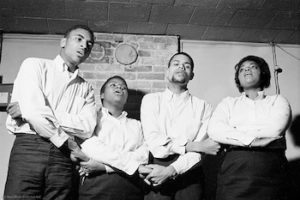
*The SNCC Freedom Singers were formed on this date in 1962. They were connected to the Student Nonviolent Coordinating Committee (SNCC), which was formed in Raleigh, North Carolina, to organize against growing injustice and violence against black people.
In the 1960 Greensboro sit-ins, four African American college students protested Jim Crow laws by sitting at a "whites-only" lunch counter. Using sit-ins as a means of protest became increasingly popular throughout the South, and the anti-segregationist organizers began to see college students as a potential resource. They found success through a surge of sit-ins in Southern college towns, where black students refused to leave restaurants that wouldn't serve them based on their race.
The group focused on educating the black community about their fundamental freedoms, including the right to vote and encouraging the integration of "whites-only" territory. This nonviolent protest brought SNCC to national attention, throwing a harsh public light on white racism in the South. Martin Luther King, Jr.'s Southern Christian Leadership Council (SCLC) called a conference later that year to find a new organization, which grew into the Student Nonviolent Coordinating Committee.
Joining forces with the Congress of Racial Equality (CORE), white and black activists rode buses together into Southern towns to protest segregated bus terminals. Soon, the SNCC established a reputation as the "shock troops" against segregation. Cordell Reagon, one of the SNCC field secretaries, was the founding member of the Freedom Singers. SNCC planned and funded the Freedom Singers' tours and paid the members ten to twenty dollars a week to work as field secretaries for the movement.
These young field secretaries were usually "dropped off" in communities where they had to arrange food and lodging. Often, group members would stay with families, helping with chores and educating children. Singing was a link between the church and the 20th-century American Civil Rights Movement.
The songs, influenced by gospel, rhythm, blues, and soul music, which have a hymn-like quality, show a relationship between "secular and spiritual elements" with ornamented, richly harmonized, and syncopated part singing. The Rev. Dr. King Jr. called music "the soul of the movement." However, although the Civil Rights Movement is closely associated with music, attempts to educate the public through music were not that common. The SNCC Freedom Singers were an exception, blending spoken and musical communication to inform the public. Bernice Johnson Reagon once stated that the Freedom Singers were, in fact, "a singing newspaper." Singing together gave protesters strength to participate in demonstrations and freedom rides—and to endure jail time, verbal and physical assaults, police dog attacks, and high-pressure fire hoses aimed at them. Singing these songs united the protesters in their shared goals: freedom and equality.
The Freedom Singers' career was high in the spring and summer of 1963 when they appeared at the March on Washington, an event that drew 350,000 people. The Freedom Singers contributed to a live album for the Newport Folk Festival in 1963, where the group sang "We Shall Overcome," linking arms with Bob Dylan, Joan Baez, Peter, Paul, and Mary. Also, in 1963, the Freedom Singers recorded their only studio album. The New York Times identified the Freedom Singers as "the ablest performing group" to emerge from a broad field of folk musicians. After recording one album for Mercury in 1963, the original group disbanded.